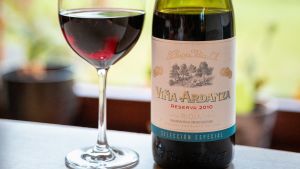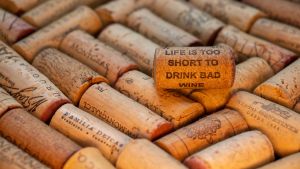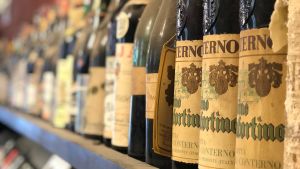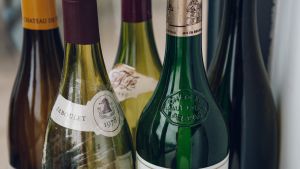
Guide by: Jessyca Frederick
Inspired by frequent questions from friends and family about different wines and wine practices, I write Useful Wine Guides so that people I don’t know might benefit from my knowledge and desire to share information, too.

Everything you need to know about aged wine to get started drinking it
The year on the bottle is not the wine’s release date. It references the year the grapes were grown and harvested and is properly called a vintage.
If the bottle does not have a vintage on the label, or is labeled non-vintage (NV), then in most cases you shouldn’t age the wine more than a year or so.
Wineries typically release new vintages on an annual schedule. They call these new releases. A new release might be vintage + one year for a light white or rosé and it could be up to 10 years or more if the winery is in Spain, Portugal, Italy, or France.
Aging starts when the wine goes in the bottle, so all bottled wine is aged wine and all wine is aged in the bottle. Prior to bottling, a wine is said to be maturing, not aging.

As wine ages, it undergoes chemical changes. These changes affect different characteristics in the wine like smoothness of tannins, the color of the wine (which takes on browner hues over time), and the flavors which shift from fruity to spiced.
My experience tells me aged wine is an acquired taste. Most wine professionals who aren’t snobs will tell you that you should always drink what you like, and if you don’t like the way aged wine tastes then, no, aged wine is not better.
Realistically, there is something we call a drinking window. These aging times convey when the experience of drinking any given wine is pleasurable. Outside that drinking window, you could say a wine has gone bad. But technically, you can age a wine forever — you just might not want to drink it.
You can absolutely age all wine. Different wines change at different rates depending on the grapes used, the way the wine was made, how the wine was bottled, and how the wine was stored. Personally I like most rosé with an extra year on it, most white wine with an extra 2-4 years on it, and most red wine with an extra 5-7 years on it.
Learn more aged wine fundamentals
For 99% of the wines you might be holding in your hand, the answer is simple: open it, taste it, and if you like it, drink it. This goes for young and old wine alike. Otherwise, follow my 3 step process to determine if you should drink that wine.

When I asked Vanessa Conlin, Master of Wine, how she decides which wines to age and which aged wines to sell, she explained the way that wine professionals decide — using an acronym called BLICCA (Balance, Length, Intensity, Concentration, Complexity, and Ageability).
When a fine wine is meant for aging, the winery typically releases a drinking window (the years where the wine will still be at it’s best). Some wineries maintain a vintage chart and tell you when to hold or drink a wine, or sadly when you’ve waited too long.
There are also regional vintage charts produced by wine publications like Wine Spectator. I don’t like these charts because they’re missing a lot of important information about the winemaking and microclimate impacts on a particular vintage.
Go deeper on whether you should drink that old wine
The only way to learn about how wine ages is to drink a lot of wine at various stages of the aging process. There are four ways to get started with this new hobby.

Comparing some wines at different stages of maturation can provide you with an affordable primer on the basics of how wine changes as it gets exposed to small amounts of oxygen.
A retailer who has older wine in inventory may have purchased more than it was able to sell through before the new release came out. It may keep these back vintages indefinitely until they sell out (a great opportunity for you to try older wine!), but I wouldn’t expect to see something more than 5 years old kicking around.
Another way to experience high-quality aged wine is to do so at fine dining establishments who specialize in filling and maintaining elaborate wine cellars. This is the most expensive way to enjoy aged wine, but you get a few bonuses with that extra money that you won’t get when you buy aged wine on your own.
This takes time (new releases you buy now won't be ready to drink for at least five years) and often a sizable investment in wine that you plan to age, not to mention proper long-term storage.
More tips to decide if you like aged wine
How many of us have the patience to age our own wine? My husband does, but I’d bet left to my own devices I’d drink much of our wine before it reaches peak maturity, simply because it’s too tempting not to. If you lack a cellar and patience, I have great news: you can explore aged wine without a wine cellar or waiting years to try it!

Provenance is the history of who has owned something — in this case a bottle of wine. The provenance includes where it purchased, where it was cellared, and under what conditions, and how it will be transported to you. Like fine art, the provenance of an aged fine wine is a must-know before you buy.
You may be wondering, why is aged wine so expensive? There are a few very good reasons why aged wine will set you back significantly more dough than buying a new release from a winery or wine shop: it started out expensive, cellaring costs money, scarcity pricing, provenance, and investment-grade wine profit.
When it comes to aged wine, the standard equipment just won’t do. There are specialized cork pullers for delicate older corks and specialized decanters for delicate older wines.
What to know before you buy old wine
Common places to buy older wine are: wineries, retailers, high-end restaurants, and auction houses. The most reliable, if you want to be certain of proper storage, are the wineries themselves, followed by wine retailers who are dedicated to long-term aging programs or who acquire aged wine directly from wineries, and lastly the auction houses and restaurants.

Library wine, back vintages, and late release are terms wineries use to describe vintages available for purchase after they might normally be released. Some wineries hold back 1-2% of each wine they make for release later to their loyal customers as library wines (they also use these libraries to keep their vintage charts up to date).
I would not buy aged wine from just any old wine shop (or grocery store) because odds are good the conditions for storage/aging were not appropriate. How many wine stores have you been into that have big, bright picture windows streaming UV light into the store? Or wine stores that aren’t 55 degrees inside? Most of ‘em, right? Hopefully these places have proper storage in the back or the basement, but you really can’t be sure how a bottle you’re looking at was treated or how long it’s been on the shelf.
Last on my list of places to acquire aged wine are auction houses and other organizations who acquire aged wine from private third parties. There are always exceptions to every rule, but the biggest issue with these groups is with verification of provenance. Unlike a painting whose condition is clear before you buy it, the condition of an aged wine is not. Auction houses have been guilty of selling counterfeit wine, too (not intentionally, but it still happens). Some places have trusted sources and stand behind the wine you purchase. Others do not.
Where to buy aged wine